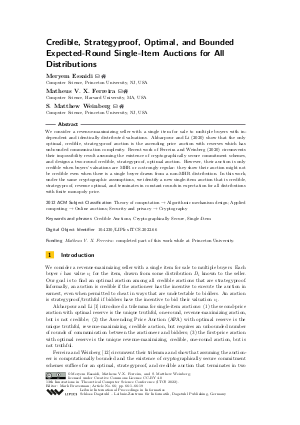Credible, Strategyproof, Optimal, and Bounded Expected-Round Single-Item Auctions for All Distributions
Authors Meryem Essaidi, Matheus V. X. Ferreira, S. Matthew Weinberg
-
Part of:
Volume:
13th Innovations in Theoretical Computer Science Conference (ITCS 2022)
Part of: Series: Leibniz International Proceedings in Informatics (LIPIcs)
Part of: Conference: Innovations in Theoretical Computer Science Conference (ITCS) - License:
 Creative Commons Attribution 4.0 International license
Creative Commons Attribution 4.0 International license
- Publication Date: 2022-01-25
File

PDF
LIPIcs.ITCS.2022.66.pdf
- Filesize: 0.71 MB
- 19 pages
Document Identifiers
Subject Classification
ACM Subject Classification
- Theory of computation → Algorithmic mechanism design
- Applied computing → Online auctions
- Security and privacy → Cryptography
Keywords
- Credible Auctions
- Cryptographically Secure
- Single-Item
Metrics
- Access Statistics
-
Total Accesses (updated on a weekly basis)
0Document
0Metadata
Abstract
We consider a revenue-maximizing seller with a single item for sale to multiple buyers with independent and identically distributed valuations. Akbarpour and Li (2020) show that the only optimal, credible, strategyproof auction is the ascending price auction with reserves which has unbounded communication complexity. Recent work of Ferreira and Weinberg (2020) circumvents their impossibility result assuming the existence of cryptographically secure commitment schemes, and designs a two-round credible, strategyproof, optimal auction. However, their auction is only credible when buyers' valuations are MHR or α-strongly regular: they show their auction might not be credible even when there is a single buyer drawn from a non-MHR distribution. In this work, under the same cryptographic assumptions, we identify a new single-item auction that is credible, strategyproof, revenue optimal, and terminates in constant rounds in expectation for all distributions with finite monopoly price.
Cite As Get BibTex
Meryem Essaidi, Matheus V. X. Ferreira, and S. Matthew Weinberg. Credible, Strategyproof, Optimal, and Bounded Expected-Round Single-Item Auctions for All Distributions. In 13th Innovations in Theoretical Computer Science Conference (ITCS 2022). Leibniz International Proceedings in Informatics (LIPIcs), Volume 215, pp. 66:1-66:19, Schloss Dagstuhl – Leibniz-Zentrum für Informatik (2022)
https://doi.org/10.4230/LIPIcs.ITCS.2022.66
BibTex
@InProceedings{essaidi_et_al:LIPIcs.ITCS.2022.66,
author = {Essaidi, Meryem and Ferreira, Matheus V. X. and Weinberg, S. Matthew},
title = {{Credible, Strategyproof, Optimal, and Bounded Expected-Round Single-Item Auctions for All Distributions}},
booktitle = {13th Innovations in Theoretical Computer Science Conference (ITCS 2022)},
pages = {66:1--66:19},
series = {Leibniz International Proceedings in Informatics (LIPIcs)},
ISBN = {978-3-95977-217-4},
ISSN = {1868-8969},
year = {2022},
volume = {215},
editor = {Braverman, Mark},
publisher = {Schloss Dagstuhl -- Leibniz-Zentrum f{\"u}r Informatik},
address = {Dagstuhl, Germany},
URL = {https://drops.dagstuhl.de/entities/document/10.4230/LIPIcs.ITCS.2022.66},
URN = {urn:nbn:de:0030-drops-156621},
doi = {10.4230/LIPIcs.ITCS.2022.66},
annote = {Keywords: Credible Auctions, Cryptographically Secure, Single-Item}
}
Author Details
Funding
- Ferreira, Matheus V. X.: completed part of this work while at Princeton University.
References
-
Mohammad Akbarpour and Shengwu Li. Credible auctions: A trilemma. Econometrica, 88(2):425-467, 2020.

-
Moshe Babaioff, Shahar Dobzinski, Sigal Oren, and Aviv Zohar. On bitcoin and red balloons. In Proceedings of the 13th ACM conference on electronic commerce, pages 56-73, 2012.

-
Iddo Bentov and Ranjit Kumaresan. How to use bitcoin to design fair protocols. In Annual Cryptology Conference, pages 421-439, 2014.

-
Phillip G. Bradford, Sunju Park, Michael H Rothkopf, and Heejin Park. Protocol completion incentive problems in cryptographic vickrey auctions. Electronic Commerce Research, 8(1):57-77, 2008.

- Vitalik Buterin, Eric Conner, Rick Dudley, Matthew Slipper, and Ian Norden. Ethereum improvement proposal 1559: Fee market change for eth 1.0 chain. URL: https://github.com/ethereum/EIPs/blob/master/EIPS/eip-1559.md.
-
Xi Chen, Christos Papadimitriou, and Tim Roughgarden. An axiomatic approach to block rewards. In Proceedings of the 1st ACM Conference on Advances in Financial Technologies, pages 124-131, 2019.

-
Hao Chung and Elaine Shi. Foundations of transaction fee mechanism design. arXiv preprint arXiv:2111.03151, 2021.

-
Richard Cleve. Limits on the security of coin flips when half the processors are faulty. In Proceedings of the eighteenth annual ACM symposium on Theory of computing, pages 364-369, 1986.

-
Constantinos Daskalakis, Maxwell Fishelson, Brendan Lucier, Vasilis Syrgkanis, and Santhoshini Velusamy. Simple, credible, and approximately-optimal auctions. In Proceedings of the 21st ACM Conference on Economics and Computation, pages 713-713, 2020.

-
Danny Dolev, Cynthia Dwork, and Moni Naor. Nonmalleable cryptography. SIAM review, 45(4):727-784, 2003.

-
Matheus V. X. Ferreira, Daniel J. Moroz, David C. Parkes, and Mitchell Stern. Dynamic posted-price mechanisms for the blockchain transaction-fee market. In Proceedings of the 3rd ACM conference on Advances in Financial Technologies, AFT '21, New York, NY, USA, 2021. Association for Computing Machinery.

-
Matheus VX Ferreira and S Matthew Weinberg. Credible, truthful, and two-round (optimal) auctions via cryptographic commitments. In Proceedings of the 21st ACM Conference on Economics and Computation, pages 683-712, 2020.

-
Matheus VX Ferreira and S Matthew Weinberg. Proof-of-stake mining games with perfect randomness. In Proceedings of the 22nd ACM Conference on Economics and Computation, pages 433-453, 2021.

-
Shengwu Li. Obviously strategy-proof mechanisms. American Economic Review, 107(11):3257-87, 2017.

-
Qingmin Liu, Konrad Mierendorff, Xianwen Shi, and Weijie Zhong. Auctions with limited commitment. American Economic Review, 109:876-910, 2019.

-
Roger B Myerson. Optimal auction design. Mathematics of operations research, 6(1):58-73, 1981.

- Satoshi Nakamoto. Bitcoin: A peer-to-peer electronic cash system, 2009. URL: http://www.bitcoin.org/bitcoin.pdf.
-
Marek Pycia and Madhav Raghavan. Non-bossiness and first-price auctions, 2021.

-
Daniël Reijsbergen, Shyam Sridhar, Barnabé Monnot, Stefanos Leonardos, Stratis Skoulakis, and Georgios Piliouras. Transaction fees on a honeymoon: Ethereum’s eip-1559 one month later. arXiv preprint arXiv:2110.04753, 2021.

-
Tim Roughgarden. Transaction fee mechanism design. arXiv preprint arXiv:2106.01340, 2021.

-
Vasiliki Skreta. Optimal auction design under non-commitment. Journal of Economic Theory, 159:854-890, 2013.

